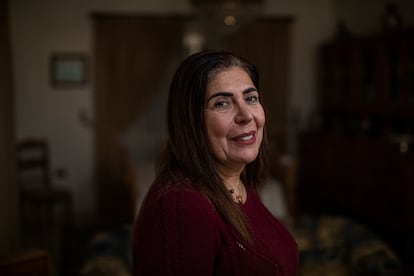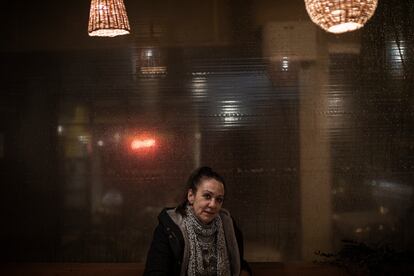Living through ‘the same hell twice’: Crisis hits Venezuelans who fled to Lebanon
Migrants escaping the poverty of the Latin American country are now wondering whether to go back, as Venezuela’s economy slightly improves while Lebanon’s remains in a tailspin

Raghida Naim was 33 years old when she decided to leave her birth country, Venezuela, and go live in Lebanon, reversing the path taken by her parents and millions of other Lebanese citizens who migrated to Latin America beginning in the mid-19th century — most notably to Brazil, but also to Colombia, Argentina and Venezuela. It was 1998, Lebanon’s economy was growing at a good pace after the end of the civil war, and Naim was adjusting to communication in Arabic, the language she grew up understanding but not speaking. One day, she was asked to prepare Venezuelan food to add diversity to a local festival, and she set up a small stand with arepas, empanadas and chicha. “I made enough food for three days, but the first day it all ran out,” she recalls, sitting in her home in the town of Chouaifet El Aamroussieh, on the outskirts of Beirut. The home was built on the land where her grandparents’ house once stood.
That’s when she began receiving requests for home delivery and event catering services. The business grew so much that in 2011 Naim officially founded Doña Arepa, a Venezuelan food company that meant she always had a freezer full of empanadas and tequeños. But when 2019 arrived, it became crystal clear that the emperor of the Lebanese economy was wearing no clothes, and the country entered a crisis defined by the World Bank as one of the three gravest in the world since the mid-19th century. The coronavirus pandemic and the explosion in the port of Beirut a year later were the final straw in a country that now imposes limits on bank withdrawals and only provides four hours of electricity a day.
Since the rest of the electricity depends on private generators that sometimes fail, Naim no longer dares to keep empanadas and tequeños in the freezer. “The power goes out for so many hours that they could go bad. I only make them on order. I always tell clients to notify me a few days early so I can prepare them,” she explains. Naim has also started to mark prices directly in dollars, because the exchange rate is so volatile (the Lebanese currency has lost 99% of its value) that she was changing her prices every week. In any case, she admits, very few clients now order the amounts they used to, and most of her remaining customers are Latin Americans who miss the flavors of home.
“They had a very bad time there [in Venezuela] for many years. Right now they are doing a little better. […] Medicines are already available. Before that there was nothing, I used to send them medicines from here, but now they are sending us the ones we don’t have here. Yes, now we are worse off than them,” admits Naim, who has considered going back to Venezuela, but is staying because her husband — who was born in Lebanon and does not speak Spanish — is against the idea. The eldest of her two daughters is already planning to study a master’s degree in Spain.
Divided families
Her case reflects the dilemma faced by thousands of Venezuelans in Lebanon, who often have both nationalities. Some, like Naim, came for family or identity reasons; others were fleeing the economic collapse or left because of their opposition to the Chavista regime. All of them have been watching as the country they abandoned keeps improving little by little, while that of their ancestors has entered a tunnel that offers little hope. There are around 340,000 people of Lebanese descent in Venezuela, according to community estimates. There are familiar faces in high positions such as the prosecutor Tarek William Saab, or the until very recently powerful Oil Minister Tareck El Aissami, who comes from a Syrian-Lebanese family. In total, there are 14 million people of Lebanese origin in the world (twice the population of Lebanon), including the former president of Brazil Michel Temer, Mexican businessman Carlos Slim and Colombian singer Shakira.
The crises in both countries keep some families divided. This is the case of Rashel Lahoud, 23, who returned to Venezuela in 2020. The Covid pandemic gave her the push she needed. She had traveled to her native country for a wedding but the pandemic measures forced her to extend her stay, while she watched from a distance as Beirut continued to go downhill. She ultimately decided to stay in Caracas, where her family had emigrated from 13 years earlier, when it was the most violent city in the world. Her father had arrived in Venezuela at the age of 18 in search of work. There, the Lahouds made a living by selling shoes as distributors of various brands, which is still their livelihood. “In the worst years in Venezuela, my father did not close the business. And luckily so, because I don’t know what we would do in Lebanon without what we have here,” says the young woman. “I got out right before it got worse. I came to Venezuela when the dollar was at 5,000 [Lebanese] pounds. Now it is at 40,000,″ she says.
Along with a brother who returned earlier, she helps her father with the shoe business. Two younger brothers and their mother are back in Lebanon, waiting for them to finish their studies so they can all be reunited again in Venezuela. “Now Lebanon is worse off,” she says, adding that the comparison between the two crises is also a matter of scale and time, because the latter country is much smaller and has been in a crisis for under five years.
In both countries, people are conditioned by inflation and the economy has been informally dollarized. In Lebanon, 80% of the population is below the poverty threshold. For several years, the same correlation existed among Venezuela’s 28 million citizens, but in the last year poverty in the country has been reduced by half, according to the Survey of Living Conditions carried out by universities in Venezuela. Gone are the days when exchange controls created a deep shortage of food and medicine. Now food is available, although most people still cannot afford it.
Economic aperture
Cristel Yamin’s family is among the seven million people who left Venezuela. A decade ago, they sold everything, closed their businesses and moved to Lebanon. In 2021 the family made the opposite journey, encouraged by the economic aperture undertaken by President Nicolás Maduro, who ― forced by hyperinflation and international sanctions ― dismantled some of the controls imposed by his predecessor, Hugo Chávez.
“In Lebanon, we used to spend entire weekends without power,” recalls Yamin. In Venezuela, public services are constantly failing, but rates are still affordable for those who are formally connected to the grid. But the 28-year-old woman adds some nuance about the newly introduced economic freedoms. “Here [in Venezuela], for many years you couldn’t have dollars in the bank, so many of us kept them abroad. In Lebanon, all the accounts were in dollars, and when the bank crisis hit, people were left without access to their money. What I earned from working, which is very little, I have been able to take abroad. My dad had the intuition to take his money out sooner,” she explains. Yamin has launched a business in her native country with a brand of handbags that are made in Lebanon, and which also imports Lebanese products. The friends she left behind are now immigrating to Europe and to other Arab countries, such as the United Arab Emirates.
Dida Saab represents the other side of the coin. She firmly believes that as long as in Caracas “only one person continues to speak” [a reference to the Chavista regime], she will remain in Beirut. Her 58 years of life have been spent in Venezuela, Mexico and Lebanon. The 2006 war between Israel and the Hezbollah militant group caught her on vacation in her parents’ hometown, and that created a special “bond” for her. “It was a ‘what everyone else is going through, I am going to experience myself.’ […] In other words, I’m going down with the boat,” she says, sitting in a cafeteria in the Lebanese capital. Three years after that episode, she settled in the country with her husband. “And no, I’m not considering living elsewhere now.”

Saab believes that Venezuelans in Lebanon “have found themselves living through the same hell twice,” but also that previous experience prepared them better for what was to come than the rest of the Lebanese population. And she points out another difference. In Venezuela, the demonstrations were all aimed against the government, and it was possible to blame one individual for the situation. In Lebanon, on the other hand, the frustrated revolution that began in 2019 questioned the entire system, with its politicians and its identity constraints. “As long as there is no internal revolution within each religious and political group, we will not be able to ask for a change of government here.”
Sign up for our weekly newsletter to get more English-language news coverage from EL PAÍS USA Edition
Tu suscripción se está usando en otro dispositivo
¿Quieres añadir otro usuario a tu suscripción?
Si continúas leyendo en este dispositivo, no se podrá leer en el otro.
FlechaTu suscripción se está usando en otro dispositivo y solo puedes acceder a EL PAÍS desde un dispositivo a la vez.
Si quieres compartir tu cuenta, cambia tu suscripción a la modalidad Premium, así podrás añadir otro usuario. Cada uno accederá con su propia cuenta de email, lo que os permitirá personalizar vuestra experiencia en EL PAÍS.
¿Tienes una suscripción de empresa? Accede aquí para contratar más cuentas.
En el caso de no saber quién está usando tu cuenta, te recomendamos cambiar tu contraseña aquí.
Si decides continuar compartiendo tu cuenta, este mensaje se mostrará en tu dispositivo y en el de la otra persona que está usando tu cuenta de forma indefinida, afectando a tu experiencia de lectura. Puedes consultar aquí los términos y condiciones de la suscripción digital.








































